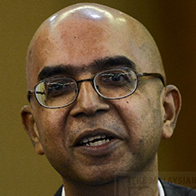In November/December 2014 – long before Prime Minister Datuk Seri Najib Razak's RM2.6 billion "donation" became public – the Merdeka Center conducted a poll to discover what voters in peninsular Malaysia think about corruption in Malaysia.
 The survey spoke with 1,019 voters from 12 states and 165 parliamentary constituencies. (Click to download the report.)
The survey spoke with 1,019 voters from 12 states and 165 parliamentary constituencies. (Click to download the report.)
The ethnic and gender composition of the respondents was similar to the ethnic composition of Malaysia - 61% were Malays, Chinese (30%) and Indians (9%). (The poll used the label "Malay" interchangeably with "Bumiputera.")
According to the report, the following were the characteristics of the respondents:
- 49% said their monthly household income was RM3,000 or less
- 22% said their monthly household income was RM1,500 or less.
- 15% said they worked for the government or in government-linked corporations (GLC).
- 36% said they worked in the private sector.
- 20% said they were self-employed or owned small businesses or farms; or engaged in direct sales.
The rest said they were housewives, retirees, students or unemployed.
The above information allows us to assess how well the poll (sample) represents the views of the nation (population). I'll limit myself to three observations.
First, the ethnicity percentages suggest the poll represents the views of the population.
Second, the self-reported income data doesn't match what the Statistics Department reported in its report "Household Income/Basic Amenities Survey 2014" (Hibas).
According to Hibas, 24.3% of households have incomes of RM2,999 or less. So, the Merdeka Center poll indicates twice as many lower income households than Hibas.
Probably the self-reported income is lower because unlike Hibas, respondents didn't include the notional rental value of owner-occupied housing or the value of non-monetary income, such as self-produced goods (eg. fruits, vegetables).
Third, the data indicates 56% of respondents were employees, while Hibas reported 65% of Malaysians are employees. This could be a peninsula versus Malaysia difference.
A common reason for the differences noted in the second and third observations is that the method of selecting respondents was different.
Hibas covered states and used historical data to determine sample sizes. The poll covered electoral constituencies and used historical data only to ensure the proportion of ethnic groups in the sample matched the national population.
Based on my review of Merdeka Center's sample against the national population, I'm inclined to believe the poll results are representative of the population.
What does the poll tell us about perceptions of peninsular Malaysians on the topic of corruption in Malaysia?
The poll asked for responses to the question "How would you rate the prevalence of corruption in our country now?"
-
77% of respondents answered "very serious or somewhat serious". The response of Malay and Chinese respondents was the same.
It's worth re-stating what the poll found: Three out of four voters in peninsular Malaysia think corruption is a serious problem.
-
75% of Chinese respondents thought the government was effective in fighting corruption, while only 46% of Malay respondents thought similarly.
It's worth re-stating that too: A majority of Malay respondents (54%) think the government IS NOT effective in fighting corruption.
-
49% of respondents thought the level of corruption in 2014 was higher than in 2013. Shockingly, 46% of government or GLC respondents agreed.
Interestingly, 49% of those who said their household income was RM1,500 or lower thought the level had increased (only 26% in the same income group thought the level had decreased).
Are the poor more aware of corruption?
Perhaps the most shocking result is this: Only 19% of Malay respondents thought ordinary people can make a difference in the fight against corruption. The corresponding response from Chinese respondents was 46%.
Why would only one in five members of the Malay community think ordinary people can make a difference in the fight against corruption, while almost half the members of the Chinese community think ordinary people can make a difference in the fight against corruption?
And, why is the "better" ratio as bad as 1 in 2? Shouldn't it be more like 19 out of 20?
Who are "ordinary people?" Why do they feel so incapable of fighting corruption? – September 24, 2015.
* This is the personal opinion of the writer or publication and does not necessarily represent the views of The Malaysian Insider.


Comments
Please refrain from nicknames or comments of a racist, sexist, personal, vulgar or derogatory nature, or you may risk being blocked from commenting in our website. We encourage commenters to use their real names as their username. As comments are moderated, they may not appear immediately or even on the same day you posted them. We also reserve the right to delete off-topic comments